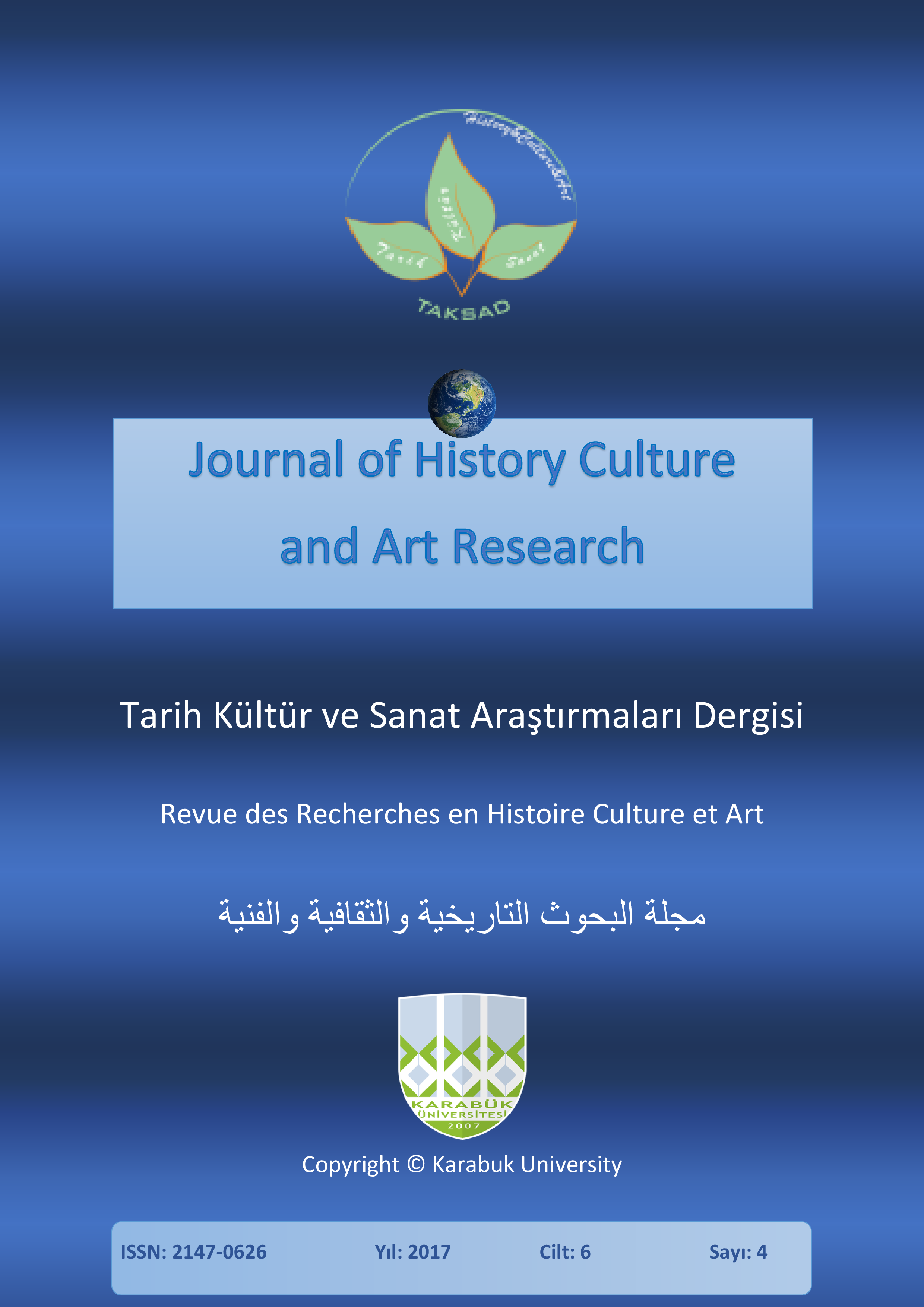Using Songs in Developing Intercultural Competence
DOI:
https://doi.org/10.7596/taksad.v6i4.1157Anahtar Kelimeler:
Song lyrics- Intercultural competences- Lingua culture- English language teaching- EFL class.Özet
Songs in teaching English are not used to the full extent. To confirm this, we created a set of exercises based on the use of songs to form socio-cultural and regional knowledge, to familiarize students with the culture and way of life of Great Britain, to gain a deeper understanding of the representatives of this linguistic cultural community. The next step was carrying out a survey on revealing the effectiveness of using songs in EFL class, more precisely their effect on the developing of intercultural competence. Following methods were used to conduct the survey: the questionnaire of teachers and students, to determine the role of English songs in the developing of intercultural competence; the analysis of English language course books to determine the presence of songs focusing on their cultural significance; Life in the UK Test, a test to check the knowledge of the history and culture of Britain. The results of the research showed the expediency of using song to develop intercultural competence. Moreover, use of songs aroused interest among students; they expressed the opinion that lyrics have a much deeper meaning and varied information than they thought before using them in English classes. They expressed a desire to continue using songs during classes in keeping with this approach.
Referanslar
Byram, M. (1991). Teaching Culture and Language: Towards an Integrated Model. In D. Buttjes and M. Byram (eds.), Mediating Languages and Culture (pp. 17-30). Clevedon: Multilingual Matters.
Candlin, C. (1992). Preface in Griffee, D. Songs in Action: Classroom Techniques and Resources (ix-x). New York: Prentice Hall.
Cheung, C. K. (1998). The Use of Popular Culture in Teaching Civics Education Unpublished INSTEP Report. Hong Kong: Government Printer.
Engh, D. (2013). Why Use Music in English Language Learning? A Survey of the Literature. English Language Teaching, 6(2), 113-127.
Federal State Educational Standard (2017). Retrieved March 22, 2017, from http://fgosvo.ru/news/4/1376.
Griffee, D. (1992). Songs in Action: Classroom Techniques and Resources (ix-x). New York: Prentice Hall.
Griffee, D. (2010). Personal communication with the author. New York: Prentice Hall.
Jalongo, M. & Bromley, K. (1984). Developing linguistic competence through song. Reading Teacher, 37(9), 840-845.
Jolly, Y. (1975). The use of songs in teaching foreign languages. Modern Language Journal, 59(1), 11-14.
Martin, M. (1983). Success! Teaching spelling with music. Academic Therapy, 18(4), 505-506.
Messner, W. & Schäfer, N. (2012) The ICCA Facilitator's Manual. Intercultural Communication and Collaboration Appraisal. London: GloBus Research.
Mitchell, M. (1983). Aerobic ESL: Variations on a total physical response theme. TESL Reporter, 16, 23-27.
Murphey, T. (1992). Music and song. Oxford, England: Oxford University Press.
Shaiakhmetova, L.; Shayakhmetova, L.; Ashrapova, A.; Mukharlyamova, L. & Mukhametzyanova, L. (2016) The developing social and cultural competences through allusions (by song lyrics of Pink and Lady Gaga). Modern Journal of Language Teaching Methods, Special Issue, 81-85.
Shen, C. (2009). Using English songs: An enjoyable and effective approach to ELT. English Language Teaching, 2(1), 88-94. Retrieved June 10, 2016, from www.ccsenet.org/journal.html
Shoepp, K. (2001). Reason for using songs in the ESL/EFL classroom. The Internet TESL Journal, 7(2). Retrieved July 15, 2016, from http://iteslj.org/Articles/Schoepp-Songs.html
Yarmakeev, I. E.; Pimenova, T. S.; Abdrafikova, A. R. & Syunina, A. S. (2016). Folk songs do magic in teaching speech and grammar patterns in EFL class. Journal of Language and Literature, 7(1), 235-240.
Zamaletdinov, R. R.; Zamaletdinova, G. F.; Nurmukhametova, R. S. & Sattarova, M. R. (2014). The lexicon and its reflection in the inner world of the individual (on the basis of the Tatar language). Journal of Language and Literature, 5(4), 333-335.
İndir
Yayınlanmış
Nasıl Atıf Yapılır
Sayı
Bölüm
Lisans
Tarih Kültür ve Sanat Araştırmaları Dergisi'nde yayımlanan tüm çalışmalar Creative Commons 4.0 CC-BY lisansı ile lisanslanmıştır.
Bunları yapmakta özgürsünüz:
- Bu eseri her boyut ve formatta paylaşabilir — kopyalayabilir ve çoğaltabilirsiniz.
- Materyalden Adapte et — karıştır, aktar ve eserin üzerine inşa et
- her türlü amaç için, ticari amaç da dahil
Alttaki şartlar altında:
Atıf — uygun bilgiyi, lisansa linki, and ve değişiklik yapıldıysa değişiklik bilgisinivermelisiniz. Sizi veya kullanımınızı lisansörün onayladığı bilgisini içermemek kaydıyla, size uygun şekilde bu işlemleri gerçekleştirebilirsiniz.
AynıLisanslaPaylaş — Eğer materyali karıştırdınızsa, aktardınızsa ya da materyalin üzerine çalıştınızsa, ancak aynı lisans ile dağıtabilirsiniz.
- Ek sınırlamalar yoktur — Lisansın izin verdiği hakları başkaları üzerinde kanunlarla ya da teknolojiyikullanarak sınırlayamazsınız.







